By Tim Clark
Published: 15 February 2007
Budding science graduates who dream of reaching for the stars can count their lucky ones, because space-science courses are experiencing a big bang here in the UK.
Katarina Miljkovic, 25, graduated with degree in astrophysics from the University of Belgrade, in Serbia. Since June she has been studying for a PhD in experimental physics at the Centre of Earth, Planetary and Space Research at the Open University (OU) in Milton Keynes.
"I couldn't find any satisfactory studies in Belgrade so I started searching for an overseas studentship," Miljkovic explains. "I liked what the Open University do and how they do it. Besides my research they are training me to be a good space scientist."
With its contributions to robotic missions for Nasa and the European Space Agency, the OU's centre has built up a credible international reputation for space science and entices research students with its work in planetary research and astrophysics. It and a number of other universities have seen a significant rise in students taking space-related studies.
Although the number of astrophysics students in PhD places is small, unlike other sciences the number is growing. According to Steve Cann, the education and training officer at the Particle Physics and Astrophysics Research Centre (PPARC), there has been a 5 per cent increase in the number of PPARC PhDs in the field of astronomy over the last five years (up from 102 awards to the October 2007 level of 160 awards).
"The PPARC's policy has been to increase the number of PhD studentships it supports and it has 100 per cent take up of its PhD studentships on offer," he says.
Although it may seem a long way away, benefits from the space sector are felt at home. The Government has realised the importance of space for the UK economy : the sector contributes £7bn annually to GDP and supports 70,000 jobs in the UK.
"Space is a very interesting topic," Miljkovic says. "There is always something new going on, and the job is absolutely fantastic. No boring schedules but projects, teamwork, brainstorming, solving problems nobody solved before, and so on. Science is exciting.
"I am part of the OU team that is suggesting new instrument technology for dust detection for future ESA and Nasa missions to Jupiter's moon Europa. It is a brand new topic where it is necessary to answer some hot scientific questions in order to have the mission fulfilled."
Karl Atkinson, also from the OU, has found space equally enticing. Atkinson is researching the Surface Science Package, an instrument from ESA's Huygens probe that landed on Saturn's moon Titan in January 2005.
"After completing an MSc in spacecraft technology and satellite communications at UCL [University College London] I jumped at the chance to do a PhD at the Planetary and Space Science Research Institute (PSSRI) at the OU," Atkinson says. "I applied for a project with the title of "planetary landers" as it seemed to combine my interest in spacecraft technology and planetary science."
Launched in 1997, The Cassini-Huygens mission was one of the longest satellite exploration missions in space. The PSSRI unit at the OU works with Nasa and ESA to collate data on the surface structure of the planet's moon.
"It was pretty exciting to be able to work on it," says Atkinson. " I arrived three months before the probe was to land on Titan so I had to learn a lot about the instrument and Titan very quickly. Nobody knew what we would find on the surface, whether it would be solid or liquid or a mixture."
On 8 January 2007 the British National Space Centre launched a public consultation on the UK's space science strategy, which will plan funding for space science between 2007 and 2010. The public consultation, which ends on 2 April, has identified space as a key growth area for industry.
According to Professor Alan Wells, a non-executive director of the National Space Centre in Leicester, space is an area that is worth investing in. "In the UK there is a whole raft of research programmes gathering pace," he says.
"In the field of planetary exploration the UK is becoming increasingly involved with both ESA and Nasa, including missions to Mars and involvement in lunar exploration."
Teaching space-related material in universities leads to more topical and lively treatment of standard science questions, he believes. "It is well known that people with science training are in short supply, but while the number of physics graduates has dropped, the numbers of astrophysics students have gone up."

